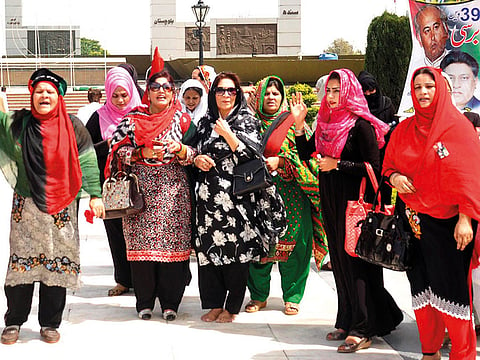Zulfiqar Ali Bhutto’s death anniversary observed
The charismatic leader brought about numerous reforms and changes in the governance of the nation

Islamabad: Pakistan observed the 39th death anniversary of the former prime minister and founder of Pakistan Peoples Party (PPP), Zulfikar Ali Bhutto (ZAB), on Wednesday.
The ceremony was held at Garhi Khuda Bukhsh Bhutto in Larkana at the native graveyard of the Bhutto family to pay homage to one of the most famous leaders of Pakistan’s history. The former prime minister and architect of the 1973 Constitution, Zulfikar Ali Bhutto was executed in 1979.
Special ceremonies were also held at party offices across the country to mark the day and mourn the loss.
Welcome camps were set up in Larkana, Naudero and Garhi Khuda Bux where strict security arrangements were made. Some 6,900 policemen along with 600 commandos, 300 women police and 700 traffic police personnel were deployed on the day, according to police sources. Walk-through gates were set-up at the tomb in Garhi Khuda Bux and at the location of the rally.
Later in the day, a public meeting was to be addressed by PPP Chairperson Bilawal Bhutto Zardari, co-chairperson and Pakistan’s former president Asif Ali Zardari, opposition leaders in the National Assembly Syed Khursheed Ahmed Shah and Nisar Ahmed Khuhro, Sindh Chief Minister Syed Murad Ali Shah, and the PPP’s central leaders in Garhi Khuda Bakhsh.
Paying tribute to ZAB, Bilawal Bhutto Zardari said he gave a vibrant, unanimous and strong structure of the state through the 1973 constitution.
“He was a friend of the poor, downtrodden and voiceless. He enlightened peasants, industrial workers, women, students and the common man about their importance and their right of franchise,” Bilawal said. Bilawal reiterated the commitment of the party leadership and workers to the ideals and vision of ZAB and vowed to accomplish his incomplete mission and struggle.
In his message, Asif Ali Zardari said that ZAB gave the country a constitution based on the principles of respect for human rights and autonomy of the federating units. “Today as we rededicate ourselves to the political ideals of Bhutto we also pledge to protect and defend democracy, individual freedom and provincial autonomy,” Zardari said.
A charismatic leader
Born on January 5, 1928, in Larkana, Zulfikar Ali Bhutto is one of the most prominent politicians of the country, who brought about numerous reforms and changes in the governance of Pakistan. He studied law from California and Oxford and served as Foreign Minister of Pakistan in Ayub Khan’s government.
He laid the foundation of the left-leaning Pakistan Peoples Party (PPP) in 1967 with this manifesto: “Islam is our religion; democracy is our politics; socialism is our economy; power lies with the people.”
Under the charismatic leadership of its first chairman, the PPP swept the 1970 election with their populist “roti, kapra, makaan” (food, clothing, and shelter) chant to become the most popular party in the then West Pakistan. Although Mujibur Rehman’s Awami League bagged the largest number of seats in the then united East and West Pakistan, Bhutto, however, refused to recognise the League’s mandate in West Pakistan, which eventually led to the creation of Bangladesh.
Bhutto served as the president of the country from 1971 to 1973 and was elected as the prime minister from 1973 to 1977. One of the biggest achievements of Bhutto’s government was the drafting of the 1973 Constitution, which remains in effect in Pakistan. He is also credited with initiating the country’s atomic programme.
The PPP won the 1977 general election; however Bhutto’s government was overthrown by General Zia-ul-Haq was cut short when the General staged a coup in 1977 and imposed martial law.
Bhutto was hanged in 1979 over murder charges in a trial that some political observers claim a “judicial murder.”
His daughter Benazir Bhutto later emerged as first female prime minister of the Muslim world, serving two short terms in office, from 1988 to 1990 and 1993 to 1996.
Sign up for the Daily Briefing
Get the latest news and updates straight to your inbox



